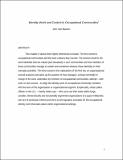Identity work and control in occupational communities
Author(s)
Van Maanen, John
DownloadVan Maanen_Identity Work.pdf (197.1Kb)
PUBLISHER_POLICY
Publisher Policy
Article is made available in accordance with the publisher's policy and may be subject to US copyright law. Please refer to the publisher's site for terms of use.
Terms of use
Metadata
Show full item recordAbstract
This chapter is about three highly intertwined concepts. The first concerns occupational communities and the work cultures they nourish. The second concerns the work identities that are valued (and devalued) in such communities and how members of those communities manage to sustain and sometimes enhance these identities in their everyday activities. The third concerns the implications of the first two on organizational control practices and takes up the question of how managers, at least nominally in charge of the work undertaken by members of occupational communities, attempt – with more or less success – to align the identity work of occupational community members with the aims of the organization or organizational segment. Empirically, urban police officers in the U.S. – mainly street cops -- who carry out their tasks within large, complex, hierarchically and functionally segmented organizations of a quasi-militaristic sort are of particular interest and serve as ethnographic examples for the occupational identity work that takes place within organizational settings.
Date issued
2010-11Department
Sloan School of ManagementJournal
Organizational Control
Publisher
Cambridge University Press
Citation
Van Maanen, John. "Identity work and control in occupational communities." Organizational Control. Ed. Sim B. Sitkin et al. London: Cambridge Univ. Press, 2010. (Cambridge Companions to Management).
Version: Original manuscript
ISBN
9780521731973